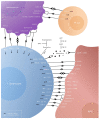Beyond CTLA-4 and PD-1 Inhibition: Novel Immune Checkpoint Molecules for Melanoma Treatment
- PMID: 37345056
- PMCID: PMC10216291
- DOI: 10.3390/cancers15102718
Beyond CTLA-4 and PD-1 Inhibition: Novel Immune Checkpoint Molecules for Melanoma Treatment
Abstract
More than ten years after the approval of ipilimumab, immune checkpoint inhibitors (ICIs) against PD-1 and CTLA-4 have been established as the most effective treatment for locally advanced or metastatic melanoma, achieving durable responses either as monotherapies or in combinatorial regimens. However, a considerable proportion of patients do not respond or experience early relapse, due to multiple parameters that contribute to melanoma resistance. The expression of other immune checkpoints beyond the PD-1 and CTLA-4 molecules remains a major mechanism of immune evasion. The recent approval of anti-LAG-3 ICI, relatlimab, in combination with nivolumab for metastatic disease, has capitalized on the extensive research in the field and has highlighted the potential for further improvement of melanoma prognosis by synergistically blocking additional immune targets with new ICI-doublets, antibody-drug conjugates, or other novel modalities. Herein, we provide a comprehensive overview of presently published immune checkpoint molecules, including LAG-3, TIGIT, TIM-3, VISTA, IDO1/IDO2/TDO, CD27/CD70, CD39/73, HVEM/BTLA/CD160 and B7-H3. Beginning from their immunomodulatory properties as co-inhibitory or co-stimulatory receptors, we present all therapeutic modalities targeting these molecules that have been tested in melanoma treatment either in preclinical or clinical settings. Better understanding of the checkpoint-mediated crosstalk between melanoma and immune effector cells is essential for generating more effective strategies with augmented immune response.
Keywords: LAG-3; TIGIT; TIM-3; VISTA; immune checkpoint inhibitors; immune checkpoints; immunotherapy resistance; melanoma; relatlimab.
Conflict of interest statement
H.G. has received grants and personal fees from Roche, BMS., MSD, Novartis and personal fees by Amgen and Pierre Fabre, outside the submitted work. All other authors declare no conflict of interest.
Figures
References
-
- Hamid O., Robert C., Daud A., Hodi F.S., Hwu W.J., Kefford R., Wolchok J.D., Hersey P., Joseph R., Weber J.S., et al. Five-year survival outcomes for patients with advanced melanoma treated with pembrolizumab in KEYNOTE-001. Ann. Oncol. 2019;30:582–588. doi: 10.1093/annonc/mdz011. - DOI - PMC - PubMed
-
- Wolchok J.D., Chiarion-Sileni V., Gonzalez R., Grob J.-J., Rutkowski P., Lao C.D., Cowey C.L., Schadendorf D., Wagstaff J., Dummer R., et al. CheckMate 067: 6.5-year outcomes in patients (pts) with advanced melanoma. J. Clin. Oncol. 2021;39:9506. doi: 10.1200/JCO.2021.39.15_suppl.9506. - DOI
Publication types
LinkOut - more resources
Full Text Sources
Research Materials


